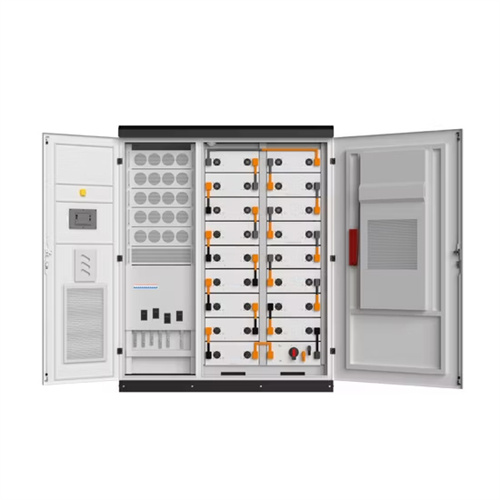Can nuclear waste water be thrown into solar power generation

Nuclear power can play a big role in the energy transition
Nuclear plants today provide 10% of the world''s electricity, all of it carbon-free – that''s almost twice the combined contribution of solar and wind.To meet the key energy goals of the United

Comparison between solar energy and nuclear energy
Environmental impact: Solar energy has a minor environmental impact during operation, but the production and disposal of solar panels are not without negative effects. Nuclear energy, although clean in terms of emissions

Rethinking Nuclear Waste: Recycling Spent Fuel in the Era of
Recycling nuclear waste could be scaled to the state and national level, progressively eliminating the country''s spent fuel stocks, significantly reducing energy-related greenhouse gas

Here''s more about the 6th Strategic Energy Plan -Nuclear power
Of the many topics covered by the 6th Strategic Energy Plan, this article focuses on our efforts and future directions for nuclear power generation. Status of nuclear power in

Global Review of International Nuclear Waste
In the current situation of global energy transition, nuclear energy maintains its reputation as a stable power generation technology, without dependence on other resources and without CO2 emissions. However, one of

The science behind the Fukushima waste water
Japan is releasing the waste water into the ocean gradually, with a green light from the International Atomic Energy Agency (IAEA). The first release is one of four, scheduled between now and the

Destroying nuclear waste to create clean energy? It can
ADS technology advances the double promise of boundless clean electricity, together with the destruction of highly toxic long-term nuclear waste. Its inherent safety will allow power plants to be located anywhere, even

Challenge to stop solar panels becoming a ''waste mountain''
A French factory is pioneering recycling of solar units as experts warn of a waste mountain by 2050. The world''s solar energy generation capacity grew by 22% in 2021. The fear of

CMV: I should support Nuclear energy over Solar power at every
Nuclear is an opportunity cost; it actively harms decarbonization given the same investment in wind or solar would offset more CO2 "In sum, use of wind, CSP, geothermal, tidal, PV, wave,

Nuclear Vs. Solar: The Pros and Cons of Both
Cons of Nuclear Energy Nuclear Waste Is Radioactive. Due to the nature of the waste from nuclear power plants, improper disposal of it can release radiation into the atmosphere, and it can be fatal to human

Our power generation | Nuclear power – OPG
Nuclear powered potential. Nuclear power remains one of the most misunderstood sources of energy available. As the world faces the reality of a rapidly changing climate, nuclear power is essential in the fight against climate

6 FAQs about [Can nuclear waste water be thrown into solar power generation ]
Do nuclear power plants produce a lot of waste?
7. Wastes Because of the enormously higher energy density in nuclear fuels, nuclear power plants produce much smaller quantities of wastes than do fossil plants. But the more relevant comparison here is with renewable energy systems which are often thought to produce little or no wastes.
What is nuclear wastewater used for?
Nuclear wastewater is produced in several applications such as nuclear energy, nuclear medicine, reprocessing facilities, and research reactors. Since large amounts of water are used to cool nuclear reactors, more liquid waste is generated than gaseous emissions in the nuclear industry.
How does nuclear energy affect the environment?
Emissions and the environment: One of the major benefits of nuclear energy is its low greenhouse gas emissions during operation compared to fossil fuels. However, uranium mining and nuclear waste management have a significant environmental impact. 4.
Does nuclear waste affect the environment?
After the Fukushima nuclear accident, many research groups have studied the effects of radioactive leakages on the environment. Despite the very little quantitative analysis on the environmental effect of nuclear wastewater, there is evidence supporting its serious threats.
How much water does a nuclear plant use?
The figures given by the US Nuclear Energy Institute (NEI, 2013) for water use by a nuclear plant normalise to 1500 l/MWh (e) for once through cooling and 2700 l/MWh (e) for a plant with wet cooling towers.
Can nuclear waste be recycled?
While the use of renewables will certainly play an important role, spent nuclear fuel, commonly referred to as nuclear waste, is an untapped resource that can be recycled into nuclear fuel for use in small modular reactors. Nuclear waste retains over 95 percent of its energy potential and can be safely recycled using the pyroprocessing technique.
Related Contents
- Solar power generation in rural areas to prevent water leakage
- Solar power generation pumps water to higher places
- Solar photovoltaic power generation for water heating
- Will solar power generation not move the water pump
- Solar off-grid power generation water irrigation system
- Chile uses solar energy to pump water for power generation
- Nuclear New Power Solar Power Generation
- Is nuclear power generation solar energy
- Pros and cons of nuclear power plants and solar power generation
- Which floors will have solar power generation
- Trinity Solar Photovoltaic Power Generation in Rural Areas
- JA Solar Power Generation Co Ltd